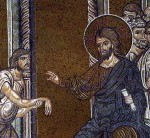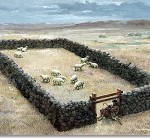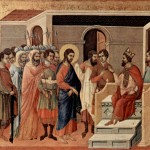
3 Words that will forever change the way you read the Gospel of John: Week 8
- June 20, 2014
- / Category 3 Words that will forever change the way you read the Gospel of John, John 8
- / Posted By Kevin Bennett
- / No Comments.
Contents
Chapter 8: The Adulteress, Light of the World, and Abraham’s Sons
 This is part 8 of a 21-part series which traces “seeing” and “hearing”, and looks at how they relate to “believing”, through the Gospel of John.
This is part 8 of a 21-part series which traces “seeing” and “hearing”, and looks at how they relate to “believing”, through the Gospel of John.
This chapter is a series of encounters and conversations with Jesus. We are, among other things, to grasp that the words of Jesus are authoritative, and that they provide the capacity to believe, and therefore to “see” truth.
We are also to note that “the Jews” fail to grasp these things, and though they think themselves awfully clever, are actually groping about in the dark.
REVIEWING THE TEXT – CHAPTER 8
The Adulteress
In the rather famous story of Jesus and the adulterer there is little about “seeing”, “hearing”, and “believing”… but what little is there is vitally important.
Jesus went to the Mount of Olives. Early in the morning he came again to the temple. All the people came to him and he sat down and began to teach them.
The scribes and the Pharisees brought a woman who had been caught in adultery; and making her stand before all of them, they said to him, “Teacher, this woman was caught in the very act of committing adultery. Now in the law Moses commanded us to stone such women. Now what do you say?”
They said this to test him, so that they might have some charge to bring against him. Jesus bent down and wrote with his finger on the ground. When they kept on questioning him, he straightened up and said to them, “Let anyone among you who is without sin be the first to throw a stone at her.”
And once again he bent down and wrote on the ground. When they heard it, they went away, one by one, beginning with the elders; and Jesus was left alone with the woman standing before him. Jesus straightened up and said to her, “Woman, where are they? Has no one condemned you?” She said, “No one, sir.” And Jesus said, “Neither do I condemn you. Go your way, and from now on do not sin again.”
– John 8:1-11
It may seem a little unremarkable, but Jesus did something which was visually rather notable when he “bent down and wrote with his finger on the ground”. What was he doing? What was he writing? Why wasn’t he speaking?
These questions just don’t get asked. Nobody even comments on it. Instead, the whole scene is held in suspense, just waiting for the moment when Jesus speaks. And when he speaks, what he says is decisive, invites no discussion, and convicts every single accuser in that place. There is no mistake, it is what they heard that mattered.
Neither Jesus nor John ever offered an explanation for the writing on the ground, and countless preachers have speculated endlessly about it. But part of the significance of the gesture is exactly this: it doesn’t matter what he was doing because what Jesus said is what matters.
The Light of the World
Throughout the series in the Gospel of John I have been highlighting the way in which Jesus is divinely equiped properly to “see” what is true, prophets like John the Baptists share that ability, and to a lesser extent, his disciples do too. Jesus declares this principle openly, here in chapter 8:
Again Jesus spoke to them, saying, “I am the light of the world. Whoever follows me will never walk in darkness but will have the light of life.”
– John 8:12
This statement means a great deal. Light and dark are motifs that are used in morality, knowledge, perception, and to some extent even “life” itself (John 1:4). But at least one of the things it means is that believers will be divinely equipped with the ability to perceive truly.
Although less overt, as Jesus goes on speaking we can find this same strong emphasis on hearing, and the same de-emphasis on “seeing”, that has been evident throughout the 4th Gospel:
Again he said to them, “I am going away, and you will search for me, but you will die in your sin. Where I am going, you cannot come.” Then the Jews said, “Is he going to kill himself? Is that what he means by saying, ‘Where I am going, you cannot come’?”
– John 8:21-22
Jesus’ words are immediately beginning to be proved right: when he goes, people will “search” (which is, “look”), because they won’t grasp what is happening. After all, it’s not his death he is talking about, but his ascension.
He said to them, “You are from below, I am from above; you are of this world, I am not of this world. I told you that you would die in your sins, for you will die in your sins unless you believe that I am he.”
They said to him, “Who are you?” Jesus said to them, “Why do I speak to you at all? I have much to say about you and much to condemn; but the one who sent me is true, and I declare to the world what I have heard from him.”
– John 8:23-26
The above passage presses the imperative to believe. Believe what? Believe what Jesus speaks, because Jesus is repeating what he heard from God.
They did not understand that he was speaking to them about the Father. So Jesus said, “When you have lifted up the Son of Man, then you will realize that I am he, and that I do nothing on my own, but I speak these things as the Father instructed me. And the one who sent me is with me; he has not left me alone, for I always do what is pleasing to him.”
As he was saying these things, many believed in him.
– John 8:30
By now we are getting used to spotting this: What happened that made them believe? “As he was saying these things, many believed”.
Before digressing (from our theme of see/hear/believe) into a conversation about “sons of Abraham”, Jesus makes another important statement:
Then Jesus said to the Jews who had believed in him, “If you continue in my word, you are truly my disciples; and you will know the truth, and the truth will make you free.”
– John 8:31-32
Notice that Jesus is not asking them to “continue in what you have seen from me”, which would actually be a more natural kind of instruction. As the old adage goes, “Monkey see, monkey do”. This means that when we see something done we are more likely to emulate the behaviour. Indeed, Biblical writers might view that with a sardonic note, because a monkey, as a “brute beast” (see Ps 73:21-22) would arguably be an antitype of godliness in Biblical thought, even without reflecting on more modern Evolutionary overtones. Monkeys are not to be taken as examples of godliness!
Instead, Jesus says, “continue in my word”. If it weren’t so familiar to us from repetition, or accepted because of it’s Scriptural authority, we might stop to wonder why he says it. He says it because it is his hearers who are blessed, not his observers.
Sons of Abraham
Although the next passage is ostensibly about the “sons of Abraham” topic, highlighting that Abraham believed God (Gen 15:6). The passage is rich with our target motif of hearing/believing – that’s what Abraham did:
They answered him, “Abraham is our father.” Jesus said to them, “If you were Abraham’s children, you would be doing what Abraham did, but now you are trying to kill me, a man who has told you the truth that I heard from God.
This is not what Abraham did. You are indeed doing what your father does.” They said to him, “We are not illegitimate children; we have one father, God himself.” Jesus said to them, “If God were your Father, you would love me, for I came from God and now I am here. I did not come on my own, but he sent me. Why do you not understand what I say? It is because you cannot accept my word.
You are from your father the devil, and you choose to do your father’s desires. He was a murderer from the beginning and does not stand in the truth, because there is no truth in him. When he lies, he speaks according to his own nature, for he is a liar and the father of lies. But because I tell the truth, you do not believe me.
Which of you convicts me of sin? If I tell the truth, why do you not believe me? Whoever is from God hears the words of God. The reason you do not hear them is that you are not from God.”
– John 8:39-47
Jesus leaves no room for mistaking his message here. Look at those last few sentences!
On another interesting point in this passage, notice that Jesus doesn’t talk about the devil doing visible things. He focuses exclusively on what the devil says. This sets up the devil’s schemes as the exact opponent to Jesus’ work – speaking truth.
In other places, Jesus talks about the deceitfulness of a false prophet’s apparent miracles (Matt 24:24, Mark 13:22), and John ascribes this to the second demonic “beast” of Revelation (Rev 13:14). Here in John 8, however, Jesus’ truthful words are important, so the devil’s lies are what he warns about.
In the final section, we get to some “seeing”. It gives rise, we should not be surprised, to some misinformation and confusion.
Your ancestor Abraham rejoiced that he would see my day; he saw it and was glad.”
Then the Jews said to him, “You are not yet fifty years old, and have you seen Abraham?”
Jesus said to them, “Very truly, I tell you, before Abraham was, I am.”
– John 8:56-57
Now, did Jesus say that he had “seen Abraham”? No.
Jesus said that Abraham knew that he would “see” Jesus’ “day”, and was glad. This is the true “knowing” that a believer is equipped with (make no mistake: even without knowing Jesus’ name, nor his ministry, Abraham was the archetypal true believer! See Romans 4:16-17, just for example). Abraham knew that the Lord would have His Day, because that is implicit in the Promise. As the Romans 4 quote reveals, part of Abraham’s faith is the Resurrection of the Dead, and Jesus is soon (as we keep reading through John’s Gospel), going to claim to be that Resurrection! (John 11:25-26)
Abraham knew he would see it, and people in Jesus’ day couldn’t see it (see Nicodemus in chapter 3). People needed to listen to Jesus’ words, not go looking for… well, anything else.
Questions to Ponder from Chapter 8
What could we do to really please Jesus? What is he even asking of us?
How much did Abraham know about God’s redemption plan?
How would you have convinced people, if you were Jesus?
Other posts in this series:

Gospel of John
Posted on May 24th, 2012 - By Kevin Bennett - 0 Comments
The Gospel of John: Many people's favourite book, but scholars neglected it for centuries! Historicity Differences between John and the Synoptic…

3 Words that will forever change the way you read the Gospel of John: Week 1
Posted on May 3rd, 2014 - By Kevin Bennett - 0 Comments
Chapter 1: Prologue, and John the Baptist introduces Jesus This is part 1 of a 21-part series which traces "seeing" and "hearing", and looks at…

3 Words that will forever change the way you read the Gospel of John: Week 2
Posted on May 10th, 2014 - By Kevin Bennett - 0 Comments
Chapter 2: Signs This is part 2 of a 21-part series which traces "seeing" and "hearing", and looks at how they relate to "believing", through the…

3 Words that will forever change the way you read the Gospel of John: Week 3
Posted on May 16th, 2014 - By Kevin Bennett - 0 Comments
Chapter 3: Nicodemus, and darkness This is part 3 of a 21-part series which traces "seeing" and "hearing", and looks at how they relate to…

3 Words that will forever change the way you read the Gospel of John: Week 4
Posted on May 23rd, 2014 - By Kevin Bennett - 0 Comments
Chapter 4: The Samaritan Woman, the Harvest, and the Return to Galilee This is part 4 of a 21-part series which traces "seeing" and "hearing", and…

3 Words that will forever change the way you read the Gospel of John: Week 5
Posted on May 30th, 2014 - By Kevin Bennett - 0 Comments
Chapter 5: Sabbath, and the Son of God This is part 5 of a 21-part series which traces "seeing" and "hearing", and looks at how they relate to…

3 Words that will forever change the way you read the Gospel of John: Week 6
Posted on Jun 6th, 2014 - By Kevin Bennett - 0 Comments
Chapter 6: Feeding the 5000, Bread from Heaven, Words of Life This is part 6 of a 21-part series which traces "seeing" and "hearing", and…

3 Words that will forever change the way you read the Gospel of John: Week 7
Posted on Jun 13th, 2014 - By Kevin Bennett - 0 Comments
Chapter 7: The Festival, The Living Water This is part 7 of a 21-part series which traces "seeing" and "hearing", and looks at how they…

3 Words that will forever change the way you read the Gospel of John: Week 8
Posted on Jun 20th, 2014 - By Kevin Bennett - 0 Comments
Chapter 8: The Adulteress, Light of the World, and Abraham's Sons This is part 8 of a 21-part series which traces "seeing" and "hearing", and…

3 Words that will forever change the way you read the Gospel of John: Week 9
Posted on Jun 27th, 2014 - By Kevin Bennett - 0 Comments
Chapter 9: To see This is part 9 of a 21-part series which traces "seeing" and "hearing", and looks at how they relate to "believing", through…

3 Words that will forever change the way you read the Gospel of John: Week 10
Posted on Jul 4th, 2014 - By Kevin Bennett - 0 Comments
Chapter 10: The Voice of the Shepherd This is part 10 of a 21-part series which traces "seeing" and "hearing", and looks at how they relate to…

3 Words that will forever change the way you read the Gospel of John: Week 11
Posted on Jul 13th, 2014 - By Kevin Bennett - 0 Comments
Chapter 11: The Resurrection and the Life This is part 11 of a 21-part series which traces "seeing" and "hearing", and looks at how they relate to…

3 Words that will forever change the way you read the Gospel of John: Week 12
Posted on Jul 18th, 2014 - By Kevin Bennett - 0 Comments
Chapter 12: This is part 12 of a 21-part series which traces "seeing" and "hearing", and looks at how they relate to "believing", through the Gospel…

3 Words that will forever change the way you read the Gospel of John: Week 13
Posted on Jul 25th, 2014 - By Kevin Bennett - 0 Comments
Chapter 13 This is part 13 of a 21-part series which traces "seeing" and "hearing", and looks at how they relate to "believing", through the Gospel…

3 Words that will forever change the way you read the Gospel of John: Week 14
Posted on Aug 22nd, 2014 - By Kevin Bennett - 0 Comments
Chapter 14 This is part 14 of a 21-part series which traces "seeing" and "hearing", and looks at how they relate to "believing", through the Gospel…

3 Words that will forever change the way you read the Gospel of John: Week 15
Posted on Sep 5th, 2014 - By Kevin Bennett - 0 Comments
Chapter 15 This is part 15 of a 21-part series which traces "seeing" and "hearing", and looks at how they relate to "believing", through the Gospel…

3 Words that will forever change the way you read the Gospel of John: Week 16
Posted on Sep 19th, 2014 - By Kevin Bennett - 0 Comments
Chapter 16 This is part 16 of a 21-part series which traces "seeing" and "hearing", and looks at how they relate to "believing", through the Gospel…

3 Words that will forever change the way you read the Gospel of John: Week 17
Posted on Oct 3rd, 2014 - By Kevin Bennett - 0 Comments
Chapter 16 This is part 17 of a 21-part series which traces "seeing" and "hearing", and looks at how they relate to "believing", through the Gospel…

3 Words that will forever change the way you read the Gospel of John: Week 18
Posted on Oct 31st, 2014 - By Kevin Bennett - 0 Comments
Chapter 18 This is part 18 of a 21-part series which traces "seeing" and "hearing", and looks at how they relate to "believing", through the Gospel…

3 Words that will forever change the way you read the Gospel of John: Week 19
Posted on Jan 2nd, 2015 - By Kevin Bennett - 0 Comments
Chapter 19 This is part 19 of a 21-part series which traces "seeing" and "hearing", and looks at how they relate to "believing", through the Gospel…

3 Words that will forever change the way you read the Gospel of John: Week 20
Posted on Jan 11th, 2015 - By Kevin Bennett - 0 Comments
Chapter 20 This is part 20 of a 21-part series which traces "seeing" and "hearing", and looks at how they relate to "believing", through the Gospel…
Related
facebook comments:
Recent Posts
- Addiction: How to Help
- … and this just in: News from the Streets of Ipswich. Issue 23
- What Happens When We Die, and Where are my Loved Ones?
- Seeking the Kingdom
- If it is by the Spirit of God that I drive out demons, then the Kingdom of God has come upon you – Matt 12:28
Tags
| S | M | T | W | T | F | S |
|---|---|---|---|---|---|---|
| « May | ||||||
| 1 | 2 | 3 | 4 | 5 | 6 | |
| 7 | 8 | 9 | 10 | 11 | 12 | 13 |
| 14 | 15 | 16 | 17 | 18 | 19 | 20 |
| 21 | 22 | 23 | 24 | 25 | 26 | 27 |
| 28 | 29 | 30 | ||||



